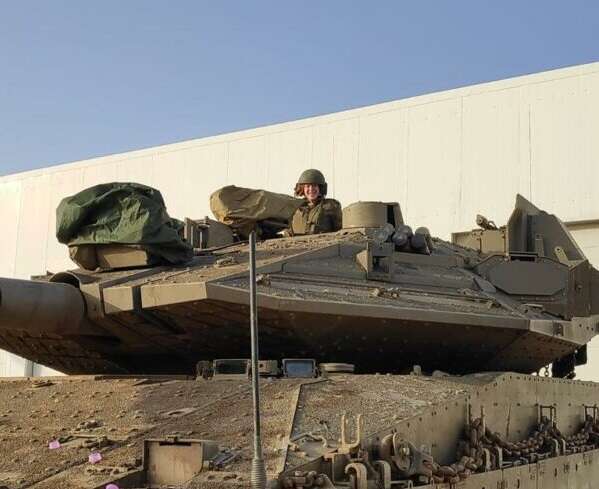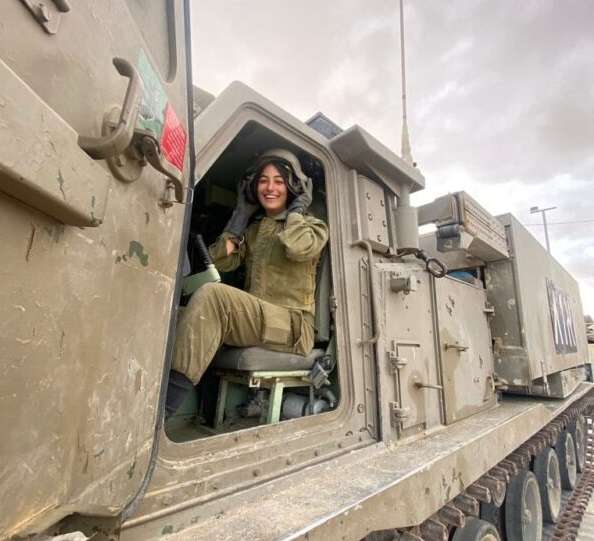
Sgt. Ofir Weingold, a technician in the IDF’s 53rd Armored Battalion, in a tank | Photo: IDF Spokesperson’s Unit
But there is one group that isn’t getting upset over the discourse – the women serving in combat units, who are the ones establishing facts on the ground day after day. Or as Sgt. Ofir Weingold, a technician in the 53rd Armored Battalion who just finished a long deployment on the Gaza border – where she was serving during Operation Guardian of the Walls in May – puts it, “Going into battle? There’s no way I’m staying behind. It won’t happen.”
Every day, female soldiers – some in combat roles, some in combat support roles – work side by side with the men. Sometimes, they are the only women in their respective companies, and they prove that opposition to their doing these jobs is rooted in nothing more than stereotypes.

“My name’s Ofir. I’m 20, from Barkan. When I was drafted, I joined the Technology and Maintenance Corps, and after basic training and the tank course I was assigned to the 53rd Battalion,” she says. Weingold serves in a unit that fixes the tanks’ sophisticated technology, and in times of war, these soldiers can be called into enemy territory to make repairs, even under fire.
“I was the first girl who joined a company of male combat soldiers, and there’s no doubt they were a little in shock at first, but slowly we started to realize the advantages – like order and organization, and a different viewpoint,” Weingold says.
Lately, the 53rd Battalion has been training intensively on the Golan Heights after seven months on the Gaza border.
“We worked hard there, under fire, day and night. It was a challenge, no doubt,” Weingold says. “Our work is definitely hard, but we aren’t afraid of hard work. A little rain, a little mud, but it’s all OK.”
During Operation Guardian of the Walls, the IDF began preparations for a possible ground incursion into the Gaza Strip, which did not happen. However, much to Weingold’s dismay, even if the IDF had gone into Gaza, she would not have been part of the operation, as the military’s directive for the integration of women in combat currently does not allow lone female soldiers from her unit to enter enemy territory in an APC.
“I’m classed as a level 3 rifleman, a combat soldier, and I can cross the border, and if there was an incursion and there was another female soldier or officer, I could go in. I’d want to, definitely. When I was in the middle of all the craziness I said that if there was a ground incursion I’d 100% be part of it, there was no way I’d stay behind – it wouldn’t happen. At a certain stage I was given leave during the operation and I turned it down. I said there was no way the soldiers would go through it without me. I stayed with them,” she says.
Staff Sgt. Daniel Hatan, 19, a company medic at the 9th Armored Battalion’s training base, isn’t afraid of the idea of going into battle, either. She is even happy to have been moved up from her initial job in combat intelligence.
“At the start of my combat service I went through border infantry training, but then I realized that I was less suited to what went on there and asked for another job. They offered me a chance to join a new pilot that would put female medics into armored combat units. They even told me it would be easy because I was already considered a combat soldier and if things got real, I would be sent across the border,” Hatan says.

“I think there are women who are really cut out to be in combat and can do everything, which is great. But I don’t think it needs to come at the expense of professionalism – you need to look closely and make sure that every female combat soldier has the right character, because it’s still a battalion full of guys. I believe that there are women who can do the job just as well, or even better,” she says.
“I’ve had to carry a few tank soldiers on stretchers, and it wasn’t easy, but the exhausting part of the job is the routine medical care. I don’t regret the path I’ve chosen. I’ve experienced things I never would have anywhere else, and I recommend that girls that fit the job do what I did.”
Cpl. Hadar Simchon, 19, serves on a rocket launcher in the 334th Artillery Battalion, and doesn’t regret having chosen the role for a moment.
“At first, I wanted to join the special forces and I hadn’t heard of the rockets, but when I found out about it, I got excited,” she says.
Simchon and her comrades operated an MLRS rocket launches that can cover areas as big as a soccer field and help batter the enemy. “It’s an insane tool with enormous power,” she says.
Her artillery battalion is now in the midst of training on the Golan Heights. “We practice using the equipment … drill everything that could happen in war.”
According to Simchon, the men and women in the battalion do exactly the same jobs. “The advantage of the MLRS is that you don’t need to lift the shells, so the equality is notable – everyone does exactly the same thing,” she says.



